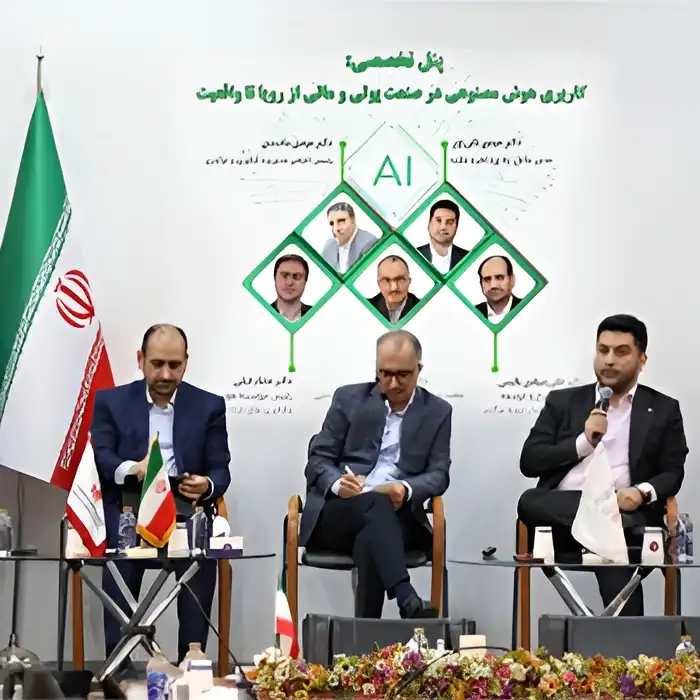Specialized panel “Use of artificial intelligence in monetary and financial industry; From dream to reality” was held on the last day of the 13th International Innovation and Technology Exhibition (INOTEX 2024) at Pardis Technology Park.
According to the public relations report of Behdakhet Mellat company, in this panel, whose secretary is Ali Abdulahi; The faculty member of Shahid Beheshti University was in charge, figures such as Hisham Fili; Head of Artificial Intelligence and Cognitive Technologies Institute of Bank Mellat, Mohammad Mehdi Taqipour; Mehdi Mohammadi, CEO of Bepadakht Mellat Company; Chairman of Innovation and Technology Management Association and Ali Fanadi Nayini; The vice president of planning and development and a member of the central insurance executive board were present.
The payment industry is a pioneer in adapting to artificial intelligence
In this panel, the CEO of Bebadakht Mellat Company, regarding the short-term perspective of applying artificial intelligence in the payment system, stated: “For reasons such as attractiveness, the percentage of interaction with people, and its integration with everyday life, the payment industry is one of the areas that dynamically adapts the most. It has artificial intelligence and this capacity has come to the aid of companies from KYC (Customer Authentication) discussions to dispute resolution discussions. In external issues, artificial intelligence is helpful in the field of e-commerce, with the suggestions it offers to customers for purchase and validation and evaluation.
Referring to the excitement of artificial intelligence topics at the academic level, Mohammad Mehdi Taghipour said: “Until human processing power was not enough and data and algorithms were not perfected, artificial intelligence was abstract. But what is important in the business space is the discussion of real applications that artificial intelligence should bring. Of course, some results can be obtained on paper, but can we trust these results? Especially, the vector of influence in the business environment, especially in the monetary and financial industry of the country, is a heavy vector. So we still can’t say that just using artificial intelligence will recognize all our algorithms and we don’t need another tool. Because there are some doubts in this field and the macro approaches to this issue are still not clear. So, as the payment industry has stepped up and expanded this versatility, we need to move forward service by service, with confidence factor and results in mind. This happened in the KYC sector and reached validation and e-commerce, and it was not like transforming all aspects of this industry with artificial intelligence at once.”
He noted: “Artificial intelligence was introduced and presented in the real sense in 1956, and from 1960, the US Department of Defense began to invest in it, but all these actions were stopped. Because the desired results were not achieved and it caused disappointment. In my opinion, our move towards artificial intelligence is currently accompanied by some excitement, while controlling this excitement, the applications of artificial intelligence should be explained more clearly to the stakeholders so that they show more favor to it. For example; We are moving towards the fact that each person will do the payment process personally and when visiting a store, without showing the ID of the goods to the sales clerk, he will pick up the desired goods and leave the store. This is a kind of excellence in the field of KYC that has reached individuality. It means we can identify the person and we don’t need a bank card or authentication card. One does not even have to stop for this. In many airports around the world, even the passport is no longer checked, and when passing through the gate, the exit process is completed simply by standing in front of a camera. This means that the classic conditions for checking passports and documents are a thing of the past. This is also happening in the payment industry.
Referring to the human resource crisis in technology-oriented companies in recent years, the CEO of Behdakhet Mellat said: “The attractiveness of the activities of many companies is not enough to convince the new generation. On the other hand, the competition for recruitment has increased between us and the countries of the region and other countries. Until they attract people with foreign currency salaries through new telecommuting startups, and this issue has increased our challenges.
He stated: “On the other hand, due to the strictness of our educational system for entering university and post-graduate studies, working in academic spaces, we have very specialized people in universities and creating common spaces between universities and industry.” It has been done, but unfortunately, we are facing a drop between the exit of people from the academy and their entry into the industry. For example; In many of our companies, artificial intelligence is not paid attention to, and managers are concerned and insist on doing things with their classic and old methods, while an artificial intelligence graduate wants to use his knowledge. We had many people who studied financial technology, but before finishing their studies, they had job offers from banks abroad. This crisis will increase over time, and in that case, we will suffer from weakness in terms of human resources and artificial intelligence. So we have to do a series of deconstruction activities in the country. For example, many companies declare that they cannot pay salaries above a certain limit, but in our company, we corrected this issue despite the possible consequences. We looked at the efficiency of people and their salaries may be even higher than the salaries of the CEO and senior managers of the company. Because we have to be flexible in these cases so that the development of artificial intelligence can have a stronger guide.
Good manpower is Iran’s superiority over regional countries in the field of artificial intelligence
In this panel, the head of Bank Mellat’s Institute of Artificial Intelligence and Cognitive Technologies called the attacks and concerns about the rebellion of artificial intelligence against humans unnecessary and said: “Since 2014, it has been clear that artificial intelligence will use itself in various fields and dimensions. It will show and from 2023, this technological phenomenon will take place almost all over the world.” Hisham Fili stated that a subset of this part is known as the generative neural network, which owes many recent developments to its power, adding: “Just as the human brain has 100 billion neurons, in the concept called representation, for each object And in practice, we have a series of numbers, and the neural network was invented on this basis in 1943, and it is nothing new. But these networks gradually progressed and in 1985, they went from one layer, i.e., one input and one output, to a multi-layered state, until the number of these layers became very large and it was called a deep network.
Pointing out that since 2014, three important factors played a role in the formation of these networks, he continued: “The first factor was the maturity of algorithms, which led to the formation of GP; Our learning needs very large hardware. A Qual 9 computer has a maximum of 9 cores and a maximum of 9 parallel processes are performed, but each GP has nearly 10,000 parallel cores. In the world, a large number of GPs were put together; Something similar to our brain that does with 100,000 parallel neurons. Based on this, we were able to create big data. The second step was taken in 2017, when one of the biggest developments took place under the title of Transformers. In 2020, GPT3 and open sources came in 2023, of which Llama, a product of Google, is at the top. Now it can be claimed that GTP4 chat, which is the strongest artificial intelligence in the world, is about one-tenth of the human brain.
The head of Bank Mellat Artificial Intelligence and Cognitive Technologies Institute noted: “The first time artificial intelligence was used in banking was 50 years ago. In 1986, an algorithm was established to predict the price in the stock market. But we owe most of the progress in this sector to the Internet.”
He described the situation of the country as pathetic in terms of hardware infrastructure and said: “Unfortunately, the Middle East and China have been sanctioned by GP. From September, according to the order of the US government, the export of Nvidia from A100 and above was banned. Another problem is that artificial intelligence progresses step by step and each level becomes obsolete very quickly. That is, if someone wants to buy a few GP shares, it is not clear whether it will be useful in a few years. But the good news is that some people in our country are pursuing artificial intelligence step by step, and good manpower is our advantage over the countries in the region in this field. On the other hand, we are successful in importing technology and hopefully we can retain these people through the expansion of the industry. In fact, we can keep ourselves at a good level by importing technology that does not require heavy infrastructure and good manpower.”
Referring to his participation in the one-year negotiations between Mellat Bank’s innovation center and Tehran University’s Computer Faculty as a representative of the university’s intelligence department, Fili said: “The memorandum of understanding resulting from these negotiations was signed last year, and based on it, Bank Mellat’s Institute of Artificial Intelligence and Cognitive Sciences and Tehran University is being established. The purpose of this institution is to meet the needs of Bank Mellat’s research and development department and produce MBDs that Bank Mellat will invest in and cover the bank’s direct needs.
The growing need to develop artificial intelligence in the three areas of banking, health and logistics
Also in this panel, the head of the Innovation and Technology Management Association, acknowledging that societies are more affected by AI (artificial intelligence) technology than other technology driving engines, said: “Artificial intelligence does two things that other technologies do not do. In other technologies, we as humans made decisions and used our creative power to create and use the capabilities of that technology to improve life. But probably in more than a decade, artificial intelligence will affect two key human capabilities, namely decision-making power and creative power, which is a big alarm for any human activity. The second point is that technologies do not wait for us to adapt. During our two-hundred-year history, an important event called the Industrial Revolution occurred at the same time as the Qajar dynasty, and Iran lagged behind it, and it happened in Iran with a delay of 150 years. But I hope we don’t have such a delay regarding artificial intelligence so that we don’t lose its opportunities.”
Mehdi Mohammadi stated that we need to adapt quickly and this adaptability in artificial intelligence happens at a high speed, adding: “Technology is the driver of intelligence and need, and we are facing generation Z, whose taste is connected with capabilities that are suitable for some cases. is not Artificial intelligence can help us respond to this taste. This generation is used to meeting all their needs in the digital space. Therefore, the bank must provide mass services and personalize these services for this generation, the solution of which is artificial intelligence. Another need of this generation is Game. This generation does not accept a service that does not have a creative and game-like aspect. On the other hand, this generation; It is the generation of integration. Meanwhile, in some banking services, banks are not at the top. For example, we receive many banking services from somewhere other than the bank, such as DigiPay, AmazonPay, and SnapPay, which are connected to other services. But this generation wants to get all their services from one place. This is where artificial intelligence can greatly help.”
He continued by quoting Darwin that the path of quality passes through quantity: “Unless there are many movements in a subject, we will not witness the formation of its brands.” But in some policies, we see other approaches. This is despite the fact that the government should not interfere with the behavior of the market, but the market should express its actions so that brands can work in a healthy environment. In this regard, the infrastructure can be adapted gradually, but there must be an important change in the field of data laws and regulations so that the development of artificial intelligence is not hindered any more. Another issue is the prevailing culture of traditional managers who innovated in the past frameworks and were successful, but they are not very supportive of new innovations in new fields.
Stating that the main needs for the development of artificial intelligence are growing in three areas, he said: “The first area; It is banking. the second domain; It is health that the traditional and protected structure of data is in turmoil. The third area is related to logistics.
The backwardness of the insurance industry from technologies among financial systems
The vice president of planning and development and a member of the central insurance board also explained the situation of using artificial intelligence in the insurance industry and said: “Among the financial systems, the insurance system is a little behind in terms of technology development, which is mainly due to the complexity of the laws and regulations in this field.” . When we examine the insurance process, a mismatch is seen from the perspective of technology development in this process. In the insurance process, technology development exists only at the beginning of the work, i.e. the sales department, and they only do comparisons. While the most dissatisfaction of the people is related to steps such as the calculation of damages, of course, measures have been taken in this area, but it was not enough.”
Stating that both the regulator, structure and data are challenging in the development of artificial intelligence in the insurance industry, Ali Fanadi Nayini added: “We have up to 30% unstructured data that prevents the effective use of artificial intelligence. In addition, the data within the insurance industry is prepared with different formulas from the data of external institutions and has different structures. In addition, it cannot be said that these data are 100% correct. The operation of the regulator is also such that there is still a paper system and data confidentiality. So we have to accept the fact that the data we have is not just ours, and where the data improves the processes, they can be widely used. Based on this, we have tried to correct the restrictions caused by laws and regulations and, if needed, we have also used the capacities between devices to help break the taboo of confidential data and the principle of non-existence of users in the insurance industry and create the final ecosystem of this industry for the development of intelligence. to provide artificial in it.
How do you rate this article?
RCO NEWS

















